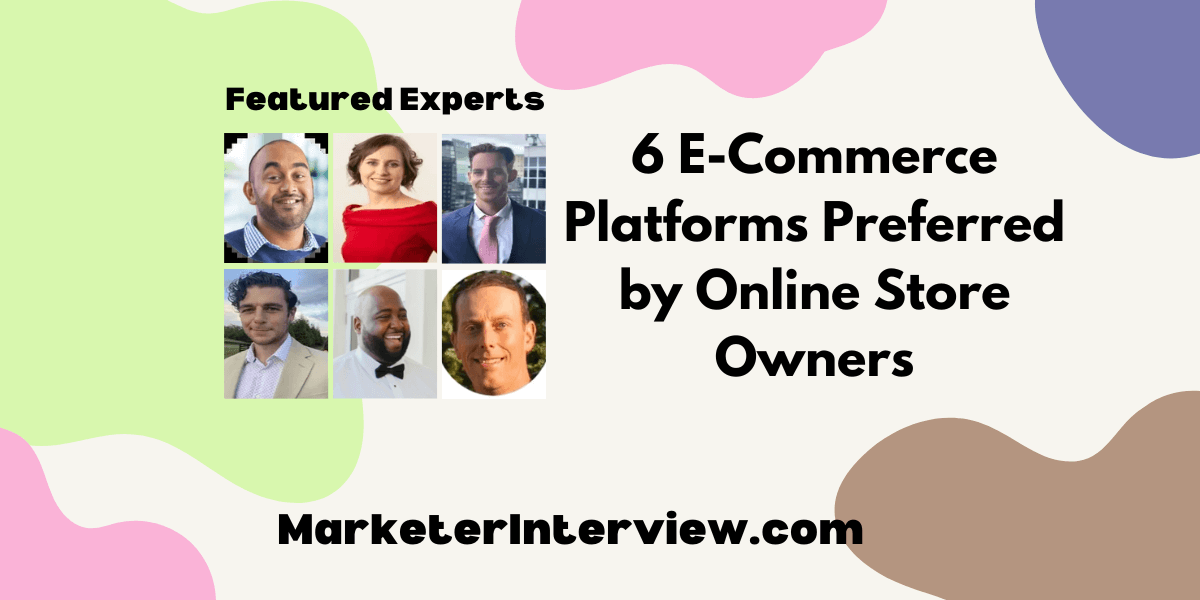6 E-Commerce Platforms Preferred by Online Store Owners
We asked CEOs and e-commerce managers which e-commerce platforms they prefer for running their online stores. From BigCommerce scaling well to Magento being customizable, here are six insights from the experts.
Want to get quoted in MarketerInterview.com content just like this? Apply to become a contributor today!
Contents
BigCommerce Scales Well
I’ve done a bit of research on this, and, generally speaking, I think BigCommerce is the best option for small- to medium-sized enterprises because it offers a good mix between scalability and customization. While it’s slightly more complex than some alternatives, it isn’t to the point that it should stop new users. It offers a range of tools for SEO optimization, multi-channel integration, and advanced analytics, making it perfect for businesses that plan to scale quickly.
BigCommerce also integrates smoothly with platforms like Amazon, eBay, and Google Shopping, expanding reach across various sales channels. The robust back-end is quite attractive for handling large product catalogs, which makes it good for businesses focused on high throughput.

Kate Kandefer, CEO, SEOwind
Choose Scalable Platforms
I have run a number of e-commerce startup businesses on a handful of platforms such as Zen Cart, OpenCart, Shopify, and WooCommerce, to name a few. I now work with clients of all shapes and sizes across most of the major platforms to help them scale their businesses internationally.
When it comes to choosing a platform, I’d highly recommend picking one that you can scale with. Platforms like Shopify and BigCommerce offer incredible ease of use, reasonably comprehensive feature sets, and third-party apps to extend their functionality. However, once you start turning over significant volume, their costs are going to eat into your margin in a big way. Furthermore, as these platforms are closed, there is only so much that can be done to extend their functionality.
Given the cost of replatforming, my best advice would be to start with a platform that’s going to give you flexibility and room to comfortably scale. WooCommerce is the obvious choice for me. The platform itself is free—of course, you still need to factor in domain and hosting costs, but these can be controlled and can be scaled without as much impact on your margin.
While the out-of-the-box storefront and admin panel might not be as shiny as the competition, it’s open-source, which allows for deep configuration and customization through a plethora of existing plugins as well as access to a huge community of affordable developers to make customizations specific to your business needs.

Matz Edstrom, Co-Founder, Dutify
Shopify Is User-Friendly
Shopify stands out as the best e-commerce platform. It’s user-friendly, allowing us to focus on delivering quality rugs rather than getting bogged down with technical issues. The platform’s customizable themes work seamlessly to present our unique, American-made area rugs in the best light possible. Shopify also provides reliable and secure transactions, which builds trust with our customers.
A significant advantage of Shopify is its extensive app ecosystem. These apps enable us to enhance the store’s functionality beyond its core features. From advanced inventory management to real-time shipping updates, these tools help streamline operations and improve customer service. The integration capabilities also allow us to leverage other services, such as email marketing and customer support platforms, ensuring a cohesive business operation.
Prioritizing SEO is essential. Using Shopify’s built-in SEO features, like customizable title tags and meta descriptions, helps improve search engine rankings. Optimizing images and creating quality content also plays a big role. This focus not only attracts more organic traffic but helps potential customers find exactly what they’re looking for: high-quality, American-made rugs.

Connor Butterworth, CEO & Owner, Southwestern Rugs Depot
Consider Your Inventory
Picking an e-commerce platform is an important decision. My methodology is that if you sell 10 products or fewer, you should go with WooCommerce. You can install it on your WordPress website. They have minimal technical requirements, and they don’t charge transaction fees. If you are launching a store with 11 products or more, go with Shopify. Shopify is user-friendly, excellent for scaling up quickly, and has 99.99% uptime.

Windy Pierre, eCommerce Growth Marketer, eCommerce Manager
WooCommerce Is Flexible
We’ve found WooCommerce to be an excellent e-commerce platform. Since we’re already using WordPress for our website, integrating it was a natural fit. It’s incredibly flexible and customizable, which is crucial for tailoring the store to our specific needs. The range of plugins and themes available is impressive, allowing us to enhance functionality and design without much hassle. The community support is also fantastic, which is a huge plus when we need a bit of troubleshooting. In short, WooCommerce has been a great choice for us, offering both flexibility and control.

Chris Bajda, E-commerce Entrepreneur & Managing Partner, GroomsDay
Magento Is Customizable
We launched our new e-commerce store six months ago, and it was a hard decision to make on which CMS we should use. We got the development work done via UpWork with a professional development company rather than choosing a local freelance developer. Eventually, we opted to go with Magento because of past experience and how it allows you to customize a lot of options and improve the site over time.
Being a business in Africa, it is very hard to get support from external vendors such as Google and Magento when setting up, but there are a lot of resources online that can help you. Another big issue we had was finding reliable hosting for the CMS platform and also being able to have the support needed for rollback, restoration, or setting up daily backups.
Magento is good for managing a large inventory when you have 5000+ products and is also easier to optimize your content with SEO and a great user experience. It was also easier to integrate a CDN to optimize our page speed for higher ranking on Google and for a better user experience.
At present, we are happy with this decision and are glad we chose Magento as it has helped us achieve results in six months that would have taken longer for a platform that we are not familiar with. For anyone reading this and faced with the same dilemma of choosing what e-commerce platform you prefer for running your online store, I would strongly recommend first shortlisting 2-3 platforms and then trying the 14-day free trial first to get the hang of things, upload photos, and content of your brand and products to get the feel of it.

Akil Adamjee, eCommerce Manager, Ideal Ceramics
Want to get quoted in MarketerInterview.com content just like this? Apply to become a contributor today!






